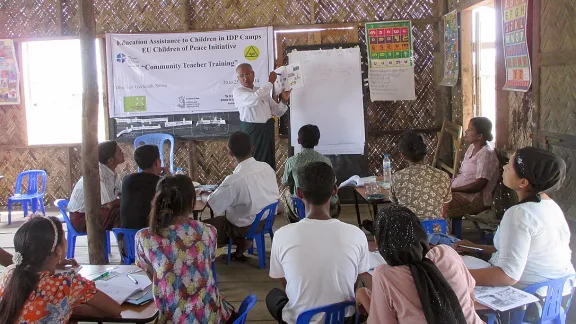
Community-school teacher training for the Children of Peace project in Sittwe. Photo: LWF Myanmar
Second phase for EU project in Rakhine State Launched
(LWI) – On 4 February 2015, the Lutheran World Federation (LWF) Myanmar program launched a new educational assistance project in Rakhine State with support of European Union (EU) funding. .
“Education Assistance to Children in Rakhine State” is the continuation of a project funded by Europe Aid through the Children of Peace Initiative, which was created after the EU received the 2012 Nobel Peace Prize. The follow-up project officially started on the 1st of January 2015 and will end on the 31st of December 2017.
The project means to improve the quality of teaching and learning and increase the children’s safety and well-being. It includes the rehabilitation of classrooms, latrines and other facilities in formal schools as well as access to a safe learning environment to children in camps for internally displaced people (IDP).
Right to Education for all
With a budget of approximately 2 Million Euros, the project will cover at least 12 formal schools and 19 camps/host villages in the four Rakhine townships of Sittwe, Pauktaw, Mrauk U and Ann. 7,056 students in formal schools and 8,198 IDP children from the age of 3 to 17 years will benefit directly.
"LWF often starts it work with local communities in times of emergency, but we are committed to long-term sustainable development,” said David H. Mueller, Regional Representative of LWF Myanmar and South East Asia. “That is why we are starting this 3-year Education Project in Rakhine. We work very closely with the partner communities and through the existing Government Structures”
Working with both formal schools for Buddhist Rakhine and education activities for Muslim IDP populations will also ensure equality in an area affected by poverty where seemingly unequal support can easily cause tensions among communities. “This project respects the right to education for all children,” Mueller said.
“Ensure holistic approach”
Mueller further emphasized the close collaboration with the State Education Department and the respective Township Education Offices. “We recognize that the Government is the primary duty bearer to respect, protect and fulfil the rights of the people. In Rakhine we coordinate our work with government and non-government organizations to ensure a holistic approach that recognizes the respective roles, responsibilities and capacities of all stakeholders”.
“To accomplish this goal, and the contributing objectives of the Education Assistance to Children in Rakhine State Project, we need the support of all of you here,” Mueller said at the official opening of the program, adding that LWF Myanmar was “proud to be funded by the European Union and guided by the State Education Department”.
Mueller stated that the involvement of the local authorities in assessment, planning and implementation of the project and the handing over of the school and the water, health and sanitation facilities to School Management Committees will ensure the sustainability of the program.
Need for more implementing capacity
The Chief Minister of Rakhine State Mr U Maung Maung Ohn emphasized the improvement for the education of children in Rakhine State and stressed the need for reliable implementing partners. “I would like to highlight LWF and the EU joint program work with children in non-conflict areas of Rakhine State,” he said, inviting other organizations for similar partnerships.
“Opportunities for promoting this in 2015 do exist and the alignment of all NGO-provided education with the Government system is one way of facilitating greater involvement and promoting transition. However, this requires not only more funding but also more implementing capacity, from NGOs as well as the Government, as current partners are reaching their limit,” the minister added.
LWF has been active in Myanmar since 2008, assisting vulnerable communities in Rakhine state with emergency response, water sanitation and hygiene, food and livelihood security and workshops about human rights and disaster risk reduction.


